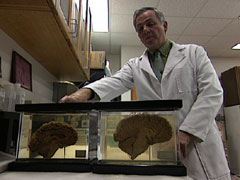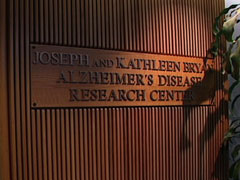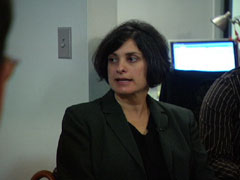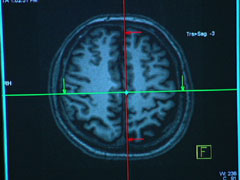Alzheimer’s Testing
BOB ABERNETHY, anchor: Now, a moral dilemma facing some of the children of people who have Alzheimer’s disease, for which there is, so far, no cure. If they could know that they are likely to get the disease themselves would they want to take a test if there were one that could predict that? And if the results were positive, what would they do then? Bob Faw of NBC News has our report.
BOB FAW: As a surgeon, he was brilliant and beloved. But as his daughter watched in horror, Alzheimer’s robbed Jerome Donald Davis of his faculties and very identity.
SUSAN DAVIS: It’s a terrible thing to witness. It’s unspeakable, and the people who love you are in unbelievable pain, and it’s a terrible loss of dignity, and it’s protracted, and nobody can help. Medicine can’t help, and science can’t help.
 FAW: Eva Finelle’s mother, her best friend, now with Alzheimer’s, doesn’t even recognize her daughter.
FAW: Eva Finelle’s mother, her best friend, now with Alzheimer’s, doesn’t even recognize her daughter.
EVA FINNELLE: She’s been the most wonderful person in my whole life. I’m living in a situation where I’m mourning somebody who’s still alive, and it’s an ongoing, everyday sadness that never goes away. I miss my mother, and she’s still here.
FAW: The children of parents with Alzheimer’s live in mourning for them and in dread for themselves any time even the simplest act is botched or memory fails
Ms. FINNELLE: Every time those things happen to me, I wonder — is this — this is about the age my mother started showing signs of different things going wrong.
Ms. DAVIS: It’s in the back of my mind when I’m standing, like everybody, in my kitchen thinking to myself, “Why did I come in this room?” I know that happens to everybody, but it chills me when it happens to me.
FAW: The fear is understandable since Alzheimer’s often runs in families.
UNIDENTIFIED WOMAN #1 (to Unidentified Woman #2): And what day of the week is today?
UNIDENTIFIED WOMAN #2: I’ll guess.
UNIDENTIFIED WOMAN #1: That’s fine.
FAW: Five million Americans are afflicted by the disease for which there is no treatment and no cure. As Dr. James Burke of Duke University points out, its effects on the brain are devastating.
Dr. JAMES BURKE (Director of the Clinical CORE, Bryan Alzheimer’s Disease Research Center, Duke University Medical Center): So this is a normal brain. It weighs over two pounds. And this is an Alzheimer’s brain that’s lost probably about 50 percent of the total brain weight.
FAW: Now a promising blood test is being refined, which in time could accurately predict even years before symptoms occur who will develop Alzheimer’s. It’s a breakthrough which ethicist Nancy Kader says could be liberating.
 NANCY KADER (Center for the Study of Ethics): I think the patient kind of has a personal responsibility to learn these kinds of things so that they can prepare themselves and prepare their loved ones.
NANCY KADER (Center for the Study of Ethics): I think the patient kind of has a personal responsibility to learn these kinds of things so that they can prepare themselves and prepare their loved ones.
FAW (to Ms. Kader): So if I don’t take the test, then in some way I’m shortchanging my family?
Ms. KADER: Absolutely. I think that it’s a little bit shortsighted to just think of it in terms of myself — what do I want to know about myself versus what do the others around me need to know in order to help me make the right choices?
FAW: Indeed, for some, like Eva Finelle, the decision to take such a test is easy.
Ms. FINNELLE: I want to know. I want to know. I don’t want my family, my children to go through what I’ve gone though. It would give me preparation time to do what I want to do, to say what I want to say, to get my affairs in order, so to speak, for when I can’t think for myself.
FAW: For others, though, like Susan Davis, almost as old now as her father was when he started showing signs of the disease, the prospect of such a test is agonizing.
Ms. DAVIS: Hit the music…
FAW: Now a successful producer at North Carolina Public Radio and the mother of two, Susan Davis says that learning she might develop Alzheimer’s would not be a source of comfort but alarm.
Ms. DAVIS: I could find this out, and it really means nothing. It means nothing until they know what it means or until they can do something.
FAW (to Ms. Davis): Knowing that you might get it — it wouldn’t be helpful?
Ms. DAVIS: You know what this would do? This might drive me crazy.
FAW: Most of all, says Davis, if she learned she’ll develop Alzheimer’s that would be a cruel ethical dilemma: wait for the disease or take her life?

Susan Davis |
Ms. DAVIS: What’s worse for my kids? To watch me deteriorate or to try and understand that I took myself from them before I deteriorated? I mean, it’s two lousy options. Who knows which of these traumas is better to overcome: your mother killing herself or your mother dying this excruciating death?
FAW: The moral quandary facing Davis and how others might respond when confronted with the same kind of news troubles doctors like James Burke.
Dr. BURKE: The downside to symptomatic or early symptomatic testing is that there is no intervention that we can do at this time. Taking away people’s hope is not something to be done lightly.
FAW: And, says Burke, since some patients cannot handle the emotional burden those test results might reveal …
Dr. BURKE: I would not perform the test, because I wouldn’t feel confident about what you do with the results.
FAW: And with more tests predicting more diseases, questions are raised about how test results will be used. This man has not been tested for Alzheimer’s, but when his insurance company learned several of his relatives have the disease . . .
JOHN: We were denied because of Alzheimer’s in the family.
FAW (to Unidentified Man): They told you, point blank?
JOHN: Yes. Yes.
FAW: And even the prospect that he might develop Alzheimer’s has already cost him dearly.
JOHN: The few friends that I’ve told in the past are no longer friends, you know, because they — I had one put it to me as, you know, why would we want to get attached to somebody that’s not going to be here, you know?
FAW: It’s an ethical minefield, then, which will continue to explode. By the year 2050, the number of Americans with Alzheimer’s is expected to triple — so many afflicted some say we now need to redefine our entire approach to the disease.
 Ms. KADER: It’s something that we’re all going to face at some point. If we don’t have Alzheimer’s we may still — there are other reasons we may begin to lose some of our faculties as we age, and so I think we need to look at it as the whole spectrum of life.
Ms. KADER: It’s something that we’re all going to face at some point. If we don’t have Alzheimer’s we may still — there are other reasons we may begin to lose some of our faculties as we age, and so I think we need to look at it as the whole spectrum of life.
Dr. BURKE: Maybe we’re expecting too much of the brain. We don’t expect the heart to function the way it did when you were 20. We don’t expect the liver and the kidneys to function. And so I think that we should expect some age-related changes. But because the brain so much determines who we are, it really places questions on our personhood.
FAW: Sometimes even defining “personhood.”
JOHN: I live with it everyday, think about it everyday.
FAW (to John): How frightened are you?
JOHN: A scale of one to 10? Nine-and-a-half.
FAW (to John): The odds are against you?
JOHN: Extremely.
JOHN’S WIFE: I’m just praying that it doesn’t happen, that it’s not going to occur.
FAW (to John’s Wife): And if the test shows that it did?
JOHN’S WIFE: Then everything would change.
FAW: Just as a new diagnostic tool, charting what can happen to the brain heralds another kind of change: knowledge, bringing relief to some and to others, fear.
For RELIGION & ETHICS NEWSWEEKLY, I’m Bob Faw in Durham, North Carolina.

